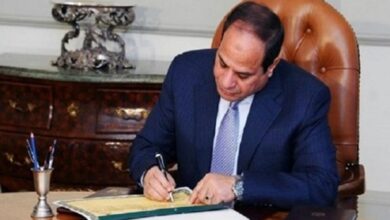“Its politics, stupid.” But in the New Egypt, we dared to hope for more.
The latest Doha Debates took place in Cairo, where guests debated the pros and cons of delaying elections in support of democracy. The discussion was lively, and I don’t wish to spoil people’s viewing of it on BBC world later this month. But here’s where things remain.
Egypt is still in the process of a revolution. It did not end with Mubarak’s holiday sojourn to Sharm al-Sheikh (perhaps the same one the Blairs used to go to?) Its still ongoing – and one of the next steps in the revolution will be the construction of a constitution that serves the people of Egypt, rather than the neo-Pharaoh.
That’s a tall order. Either the existing constitution has to be seriously taken to pieces and built up again, or it will have to be annulled and a new one made from scratch instituted.
That will take time and the stakes are high. The military junta that currently rules Egypt wants to get out of the business of being the state. It is keen to undertake quick amendments (the outcome of which depends on Saturday’s referendum), go for parliamentary elections immediately, and then presidential elections – all by August.
That’s risky. A constitution that is full of legal contradictions could be passed, followed by elections that would favor the former ruling National Democratic Party (NDP) and the Muslim Brotherhood (MB). This seems almost inevitable – the previous Egyptian regime imposed so many restrictions on political life, other parties (new and old) would be unprepared to compete. In a fully developed democratic system, campaigns are not built overnight.
That’s why I’ve been in favor of delaying the elections. I’m not particularly afraid of the MB – not because they seem to have become woolly liberals, but because they have shown themselves to be a pragmatic political force. And just like any other political force, they have proven themselves to be after partisan benefit, perhaps in an (mistaken) assumption that what is best for them is best for the country.
Egypt is not solely a Muslim country, let along a solely MB country. It’s a country of Muslims and Christians, religious and non-religious, as well as a variety of other groups that make up this society. Moreover, it’s a country that recently saw both sectarian violence as well as a desire to enfranchise the entire citizenry in a way that has never happened before. And that citizenry deserves an opportunity for a better future.
It frankly does not deserve a parliament that is dominated by the remnants of Mubarak’s party and proponents of a movement that raises all sorts of worries (legitimate and illegitimate) among wide swathes of the citizenry.
The NDP knows this. No one is surprised that it is pushing for early elections – because the more time is given to new parties to organize, the more likely it is that the NDP’s share in parliament will decrease. That kind of partisanship against the interests of the nation is what one expects from a party that was Mubarak’s.
The MB knows this as well. One had hoped that a party that had suffered so much under an autocratic system might have chosen to shelve partisan interests. The MB could have sacrificed short-term political gains in order to push for real democracy. Rather than voting yes or no, it could have worked with all political forces involved in this revolution to negotiate a better alternative with the military.
No one should be idealistic about what happens to Egypt without a new constitution and new elections – it will be a country that is, at least temporarily if not longer, heavily dominated by the army. It’s going to be messy. But that’s politics.
Beyond politics is something else – and that’s the issue of building national unity. At that Doha Debates, there were a lot of accusations thrown at the MB – and many of them unfair. The MB was in Tahrir as well, and its youth fought at least as hard as anyone else in the square when it came under attack. Few organizations can claim to have been persecuted by the previous regime more than the MB. And while people should be critical about it, there’s a fine line between criticism and ‘othering’. One is indispensable in a diverse society. The other is the first step of de-humanising that which we don’t like – and that’s unacceptable.
That said, many in Egypt do feel threatened by the MB. The Coptic community of Egypt feels under threat, as a non-Muslim minority.
Non-Islamist Muslims at large feel uncomfortable with MB political influence. And if the 25 January uprising meant anything, it means supporting the interests of the nation at large over other partisan considerations.
That means sacrifice. Building trust and national unity invariably does. But that’s the more charitable, more moral, the more Egyptian way. And for the MB, wouldn’t it be the more… Islamic way, too?
It’s not the political way. But: in the new Egypt, we hoped for more.
But… “its politics, stupid”.
HA Hellyer is Fellow of the University of Warwick and the Institute for Social Policy and Understanding. He currently resides in Cairo, and is writing a book on the Arab uprising. His website is www.hahellyer.com.




